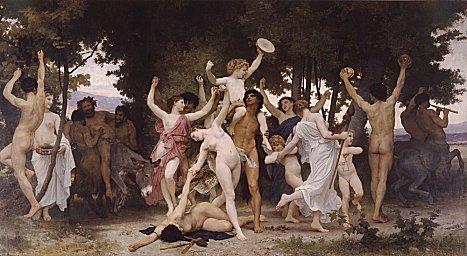December 17: Christmas and Saturnalia
Saturnalia and Christmas
It was on this date, December 17, that the ancient Roman version of the universal midwinter nature festival which they called Saturnalia began. The week-long festival was named in honor of Saturn, the Roman god of the sowing of the harvest, and in its earliest forms included a death ritual, commemorating winter. The holiday was one of many that Roman slaves enjoyed throughout the year — demonstrating that pagan slaves were treated far better than Christian serfs — and one eagerly anticipated because, for a day, slaves were waited on by their masters. This custom probably originated with the Babylonians, was later adopted by the Persians, and became popular under the Romans.
During the week of the 17th through the 23rd there were religious ceremonies, boisterous revels, the exchange of gifts, visits to friends, public gambling, greetings of "Yo, Saturnalia!" (much like "Merry Christmas!") along with a feast at the temple. If these customs seem familiar to moderns who celebrate Christmas, they are complemented by the Christian appropriation of the Winter Solstice (about December 21) and the Birthday of the Unconquered Sun in Mithraism (December 25) to co-opt the rival religions and market the new one. The worshippers of Mithra used candles and incense at their cave-temple on Vatican Hill.
The Romans were not alone in celebrating, at the winter solstice or just after it, the birth of a solar or vegetation god, one who would save the world from the darkness and sterility of winter. The Egyptians in midwinter celebrated the birthday of the sun-god Horus, displaying a tableau of a divine baby in a manger with the mother beside it, just like the baby Jesus and mother Mary. On the same date in Alexandria, in the Temple of the Virgin (the Koreion), after praying all night the people would break out into rejoicing because Korê (Κόρη), the Virgin, had "given birth to the Eternal."
There was a dark side to Saturnalia, at least in its early days. A Lord of Misrule was appointed for the feast of Saturnalia, one who presided over the festivities and had the power to command anyone to do anything during the holiday week. Sir James George Frazer recounts in his Golden Bough the sacrifice on the first day of the Saturnalia of a handsome young man, after a month of treating him as a king:
We are justified in assuming that in an earlier and more barbarous age it was the universal practice in ancient Italy, wherever the worship of Saturn prevailed, to choose a man who played the part and enjoyed all the traditionary privileges of Saturn for a season, and then died, whether by his own or another's hand, whether by the knife or the fire or on the gallows-tree, in the character of the good god who gave his life for the world.
So the death and resurrection play that is so central to Christianity, and conveniently set in the dead of winter to culminate in the birth of spring, was acted out for a pagan audience long before the Christian cult that copied it.
Most of the pagan cults are exterminated now, thanks to the love of Christ, but the celebrations continue under new management. It seems that the pagan spirit, minus the bloodshed of the executed-then-resurrected redeemer-god, lives on in this post-Christian world. Saturnalia, or at least the human feeling Saturnalia celebrates, just will not be denied.
Originally published December 2003.


